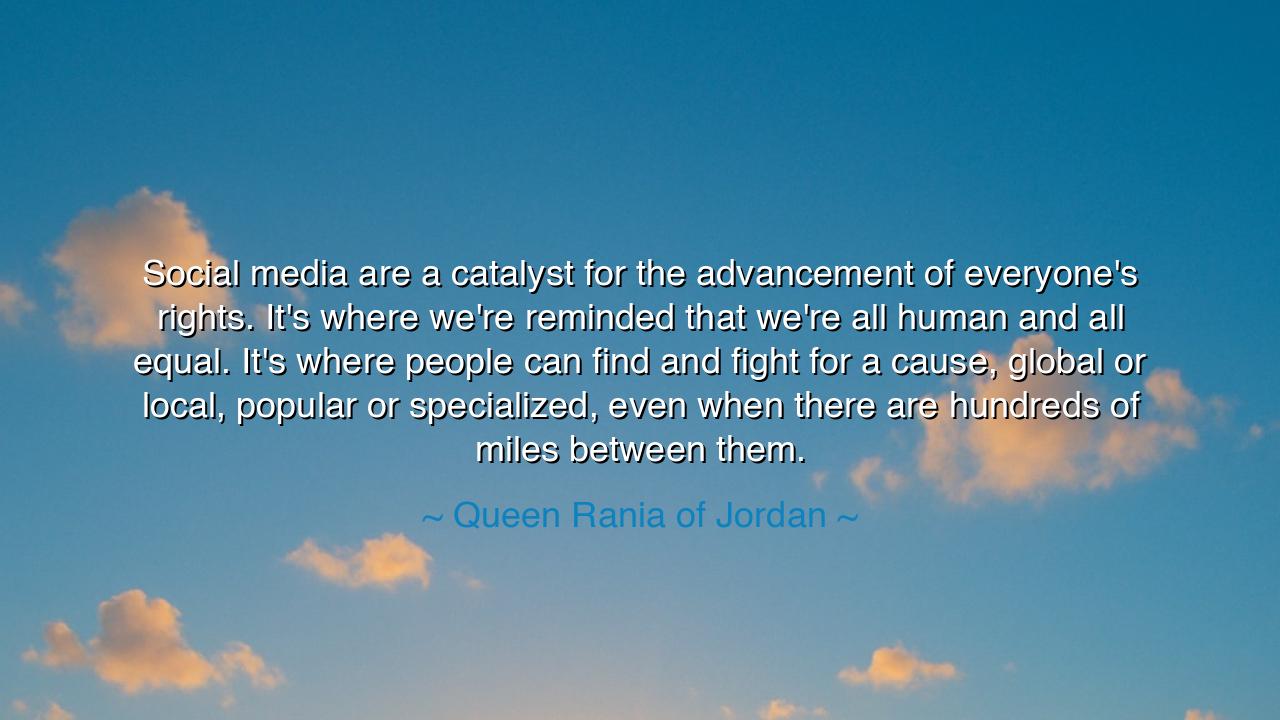
Social media are a catalyst for the advancement of everyone's
Social media are a catalyst for the advancement of everyone's rights. It's where we're reminded that we're all human and all equal. It's where people can find and fight for a cause, global or local, popular or specialized, even when there are hundreds of miles between them.






“Social media are a catalyst for the advancement of everyone’s rights. It’s where we’re reminded that we’re all human and all equal. It’s where people can find and fight for a cause, global or local, popular or specialized, even when there are hundreds of miles between them.” These are the words of Queen Rania of Jordan, a voice of wisdom in the modern age, spoken not as mere praise for technology, but as a recognition of its power to awaken the ancient spirit of unity that dwells in all humanity. In these few lines, she transforms what many see as distraction or vanity into something sacred — a new forum of connection, a modern echo of the ancient agora, where citizens once gathered to speak truth, share hope, and build justice together.
The meaning of her words lies in the belief that technology, when guided by conscience, becomes the servant of human dignity. In the past, empires were shaped by the strength of armies or the wealth of kings; now, in the digital age, power belongs to those who speak, connect, and inspire across the invisible threads of the web. Queen Rania, who has long championed education, equality, and human rights, sees in social media a revolutionary instrument — not of domination, but of liberation. Through it, a single voice, once silenced by distance or oppression, can now resound across continents. A student in Amman can speak to a farmer in India; a nurse in Nairobi can share hope with a teacher in New York. What once required armies now requires awareness, and what once depended on privilege now depends on courage.
The origin of Queen Rania’s thought lies in her lifelong mission to bridge divides — between East and West, tradition and progress, privilege and poverty. Living in a region often torn by misunderstanding, she recognized early that the digital realm could become the new meeting place of minds. In her words, “we’re reminded that we’re all human and all equal” — a statement that echoes the wisdom of the ancients, who taught that every soul, no matter its birth, shares the same divine spark. Her quote breathes new life into that timeless truth, showing that in the realm of social media, that spark can at last be seen — unfiltered by race, creed, or nation.
Consider the story of the Arab Spring, when ordinary people, armed not with weapons but with smartphones and words, challenged the chains of corruption and tyranny. Through social media, they called out injustice to the world and found solidarity among strangers. Their courage showed both the promise and peril of this new power. It reminded the world that truth, once imprisoned within borders, could now fly freely through the currents of the digital sky. And though their revolutions were not without suffering or complexity, they proved that connection awakens courage, and that when human beings share their stories, they remember that they are not alone.
But Queen Rania’s words also carry warning and humility. For if social media is a catalyst, it can also be a fire that burns without guidance. The same platforms that unite can divide; the same networks that uplift can mislead. Equality is not found in access alone, but in how we use that access — whether we speak with empathy or with malice, whether we share truth or spread deceit. Thus, her quote is both a celebration and a call to responsibility: that we, the citizens of this new digital world, must become the stewards of its conscience.
The ancients believed that speech was sacred, for words could build or destroy worlds. So too must we treat the realm of social media — not as a battlefield of egos, but as a temple of dialogue, where every post, every voice, becomes an offering toward understanding. The power of this age is that anyone can speak; the challenge is to ensure that those words serve humanity and not vanity. If used with wisdom, this great tool can fulfill what generations have long sought — not conquest, but communion.
So let this be the lesson from Queen Rania of Jordan’s words: that every generation inherits a tool that can either deepen division or awaken destiny. The printing press brought books; the radio brought voices; the internet brings souls together. Use it, then, not to echo noise, but to amplify truth. Seek not followers, but fellowship. Defend the voiceless, share the stories of the unseen, and build bridges where others would build walls. For when we use technology to remember our shared humanity, we fulfill the oldest dream of civilization — that one day, every voice may be heard, and every heart may be known as equal beneath the sun.






AAdministratorAdministrator
Welcome, honored guests. Please leave a comment, we will respond soon